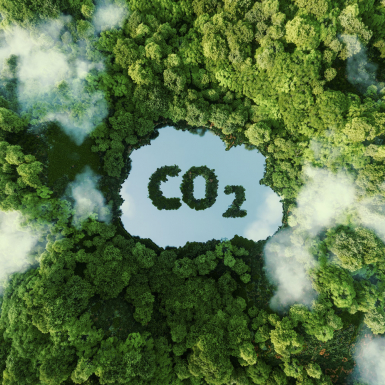OPPORTUNITY
The effects of climate change are already threatening the world with wildfires, droughts, and rising sea levels. Failure to mitigate climate change is deeply dangerous. The faster emissions are reduced in the near-term, the better are the chances of preventing the worst impacts of climate change. It is more than likely that in complement to the transition to a clean and renewable energy/carbon neutral society and economy (which should remain the most important action to be undertaken), ways of removing significant carbon dioxide (CO2) from the atmosphere and preventing its release in the atmosphere will be required.
The opportunities that we have at hand are of two natures, either biological via carbon sequestration in vegetation and soils, or technological via preventing carbon to be released or capturing directly and storing air carbon.
Biological solutions rely on improved land use and management practices. This includes reforestation and afforestation, as well as managing existing forests in a better way to remove more carbon and extend the amount of timber that goes into long-lived wooden products. Regarding technological solutions, several trends have emerged addressing different purposes: Direct air carbon capture and sequestration carbon capture utilisation and storage, Biomass energy with carbon capture and storage.
Key focus areas
- Technological carbon capture and storage – support identification of suitable and safe geographical sites for deployment, monitor environmental, industrial, and geological risks related to carbon transport and storage, such as potential carbon leaks and geological events, support measurement/computation and monitoring of total net carbon emissions balance (taking into account end-to-end emissions and removal actions), support efficient carbon capture and storage operations.
- Biological carbon removal and sequestration – support measurement/computation and monitoring of total net carbon balance, support monitoring of afforestation/reforestation/restauration actions, support identification of sites for afforestation, reforestation & restauration actions, support monitoring of farming sequestration actions, support efficient afforestation/reforestation/restauration actions.
THE VALUE OF SPACE

Space technologies and data can play a key role in the development of carbon capture, storage, and sequestration services.
Satellite Navigation (SatNav): GNSS can be used for locating and geo-referencing new sites of deployment, and for supporting local teams in the implementation of the planned afforestation/ reforestation/ restoration actions. GNSS will also be used to geo- and time- referenced sensor information of deployed IoT systems.
Satellite Communication (SatCom): Satellite telecommunications will provide connectivity to remote areas with limited terrestrial connectivity, where especially most carbon storage sites, and reforestation/ land restauration actions will be located. This connectivity will be used, for example, to remotely monitor local energy production and geological sensor status and provide in-the-field team with access to needed on-line services. IoT connectivity may also be needed along pipelines used carbon transportation to remotely monitor their integrity.
Satellite Earth Observation (SatEO): Earth Observation data can provide instrumental information for the identification of the best geographical sites for establishing new afforestation/reforestation/restoration sites, monitor ongoing sequestration actions and support the evaluation of sequestrated carbon volume. Similarly, these data can contribute to identify safe sites for deploying carbon capture and underground storage facilities, detect potential issues such as leaks (via emissions detection or effect on vegetation monitoring) or land subsidence, and contribute to total net emissions computations.
WHAT ARE WE LOOKING FOR?
Kick-Start activities explore the business opportunity and the technical viability of new applications and services that exploit one or more space assets (e.g., Satellite Communications, Satellite Navigation, Earth Observation, Human Spaceflight Technology). This call for Kick-Start activities is dedicated to the theme ‘Carbon Capture, Storage and Sequestration’, which means that the call is open to companies that intend to develop space-enabled applications and services relating to the themes in this domain.
HOW TO APPLY
- Register by completing the online questionnaire on esa-star registration (this provides for the minimum ‘light registration’)
- Visit esa-star publications and search for this opportunity to download the official tender documentation. Official documents will include proposal templates, a draft contract, and additional information about this opportunity.
- Use the official documents to prepare your proposal.
- Write your proposal and obtain a Letter of Support from your National Delegation, if needed (see Authorisation of Funding section below).
- Submit your proposal via esa-star tendering by the deadline.
AUTHORISATION OF FUNDING
ESA Space Solutions can provide funding to perform Kick-Start activities under this ‘Carbon Capture, Storage and Sequestration’ initiative to any company (economic operator) residing in the following Member States: Belgium, Czech Republic, Denmark, Estonia, Finland, France, Germany, Hungary, Ireland, Italy, Luxembourg, the Netherlands, Norway, Poland, Portugal, Romania, Spain, Sweden, and the United Kingdom.
However, please note that currently, Austria, Greece, and Switzerland are not supporting Kick-Start activities.
Applicants must inform the National Delegation of the country they are residing in to obtain a letter of authorisation allowing the funding of the proposed activity. Contact details of each national delegate can be found here (http://business.esa.int/national-delegations).
Currently, the United Kingdom, Ireland, Norway, Germany and Italy have pre-approved funding for this kick-start activity. Applicants from these countries do not need to obtain a letter of authorisation from their National Delegation.
Kick-Start activities are funded at 75% by the European Space Agency for a maximum of €60K per contract.
WEBINAR
- 19 January 2022 11:00 CET (10:00 GMT)
Guest speaker: Guloren Turan - General Manager - Advocacy & Communications, Global CCS Institute



